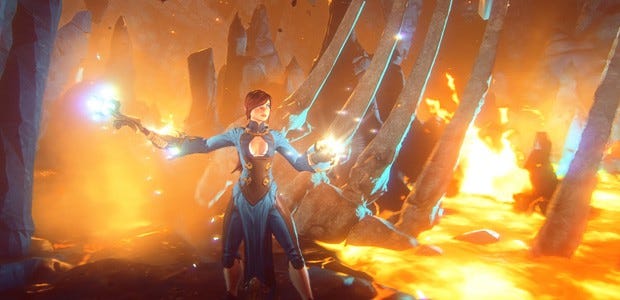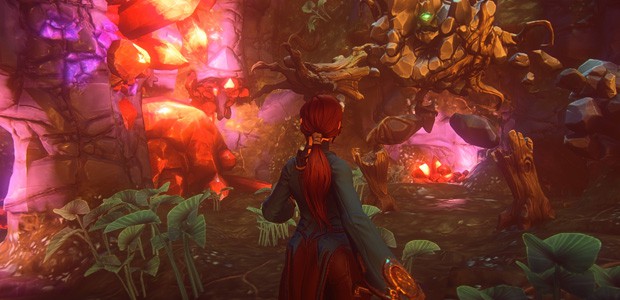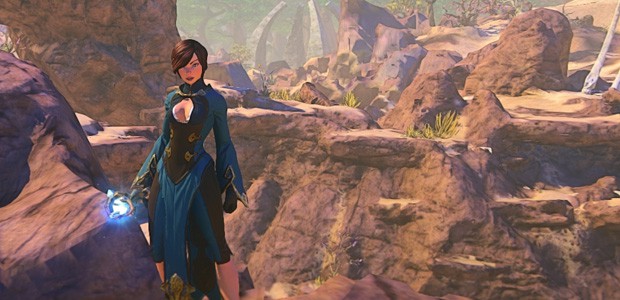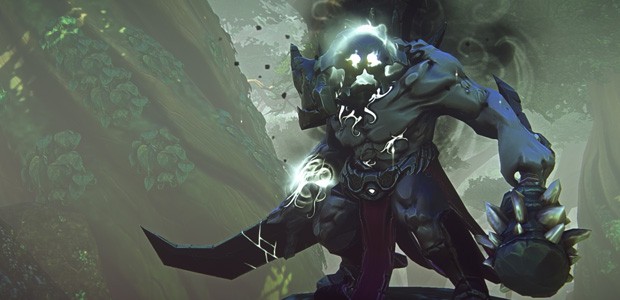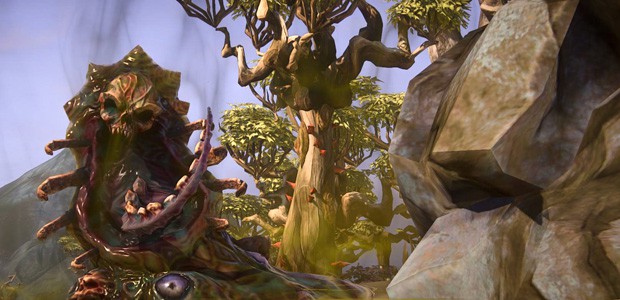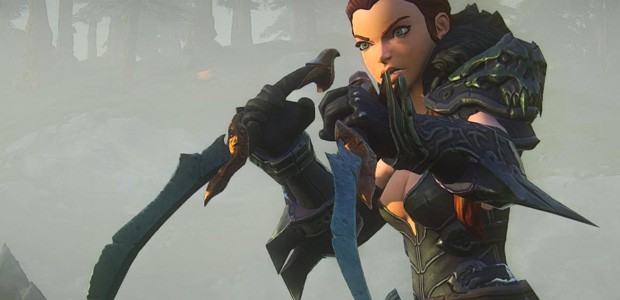The RPG Scrollbars: EverQuest Next Killed The MMORPG
It's been a pretty good run
Light a candle for the genre, it's basically done. Oh, it'll keep ticking along, of course. This month we've seen Black Desert Online, there's others on the way, and there'll always be some audience for both the mostly Korean-born clickers and the occasional new idea. Personally I'm hoping for City of Titans to scratch that superhero itch that Champions Online sure as heck can't, and for Shroud of the Avatar to bring back some of that Ultima magic. (Take a shot.) But as a genre to actively watch for cool stuff? Stick a fork in it. Sony- sorry, Daybreak was pretty much the last great hope of breathing life into it in any form remotely close to how Everquest did it back in the day, never mind giving it back the cultural clout from World of Warcraft's heyday.
In case you missed the hype, Everquest Next was due to be a crazy leap forward in many ways. A world built of voxels that could be blown up by spells, carved through to find secrets, torn up by epic battles. Rallying Calls, in which cities would need to be constructed by players, face threat by invasion, and then defended by vigilante players long after construction. Monsters driven by global AI instead of simple hand-placement, making it possible to defend the roads from settlement to settlement, but also have their cultures encroach upon civilisation if left unchecked. Worlds that players would not only live in, but construct, with Everquest Next intended as both a demonstration of how much freedom there would be, and as a place where buildings and other key bits of architecture would be directly sourced. Not since Richard Garriott's infamous dragon story has a world sounded so reactive, right down to nomadic orcs relocating if their settlements ended up repeatedly raided.
...
So what went wrong?
Daybreak's reason is, bluntly, that the game wasn't shaping up to be any fun and so the plug was pulled. There's honour in that if true, though it has to be said that only Planetside 2 hinted at the company being able to pull off something as impressive as Everquest Next intended to be, with the word "Sony" not hurting when looking at its intended scale. Looking at the rap sheet, H1Z1 has pretty much troddled along without incident or excitement of late, supposed pathfinder Everquest Landmark has shown about as much progress as the continental drift of its own landmasses, and of Next there's been basically nothing, except for word that the development team had been moved across from Landmark to give it priority, and now presumably are back again, to punch in everything from an economy to updated tools to worthwhile PvP in time for the newly announced Spring launch and $9.99 entry fee. Which, while pretty appropriate for the amount of content on offer right now, isn't exactly a confidence builder for its longevity.
Who knows, maybe it'll be great. It's not really the environment that you can imagine the next big thing in MMORPGs emerging from though.
The problem is, where else could be the source of an MMO with that same level of potential oomph? All the major players now have tried and failed and moved on. CCP could have merged the trust it places in players in Eve Online with a more personable setting with World of Darkness. Nope, gone. Blizzard's Project Titan? Gone, with some pieces going to Overwatch, and Hearthstone probably more profitable than it would ever have been. Funcom? Hahaha, no. NCSoft perhaps could, but past attempts like Tabula Rasa and more recently Wildstar have left it licking burned fingers.
Elsewhere, the writing is on the wall - it's more personal, focused, short-form but long-engagement games that are working right now, such as Destiny, The Division, and MOBA derived stuff. With the exception of Evolve of course, whose player remains confident it'll take off any time now. (Keep the faith, Brian!)
I've talked about the problems facing MMOs before, but it's probably worth repeating one of the biggest - the magic factor. By that, I mean that when the genre first hit, its fundamental sell felt magical - that we could enter amazing worlds with millions of other people, and every moment of doing so felt special. Now, not only is it no big deal, but we've come to realise that much like the real world, what matters isn't how many people you're surrounded by, but how many people you're actually with.
The modern multiplayer world is geared more towards social groups that exist in reality - four or five friends playing Dota together, or teaming up with a friend in the evening to go and score some Destiny loot in an experience that's a mix of chat, work and play. I'm speaking hypothetically of course, I have no friends. But that's how it's configured. MMOs have stepped back from the problem by increasingly making group content an optional extra, or something that can be purely farmed as necessary, with only Final Fantasy XIV - a game that gets better and better with every update, incidentally - really having the courage to say "No, you will learn boss battles by fighting an Ifrit who can party-wipe you, and you will queue up for dungeons when we say."
It feels like an exception to the rule though, which gets away with it as much for the fact that it can offer chocobos and a Final Fantasy world as a carrot to go along with what to most players increasingly seem to consider the stick. It probably doesn't hurt that if you're a long-term fan of Final Fantasy (and yes, I've played them for many years myself) you've largely proven your willingness to tolerate a fair amount of bullshit to get to the stuff that you like. That didn't work out so well for anything from The Old Republic to DC Universe Online - though both of them are currently ticking along and still getting quite a few updates rather than sitting in MMO stasis.
New MMOs meanwhile have largely given up on taking over the mainstream and becoming the next World of Warcraft, simply because there's far more money to be had targeting the existing player who just wants a change of scenery, the casual F2P player who might be sucked in but at least adds a bit of screen-meat to the empty worlds, or the guilds that inevitably have a bee in their bonnets about something in whatever they're playing and tend to move en masse between games before settling down again for the long-haul, and most of all, markets like Russia and Korea where there's a hunger for what in the West often gets summarily dismissed. Starforge being described as "From the makers of Allods Online" for instance is something of a warning siren over here, carrying with it the stench of pay-to-win and similar mechanics, but not so much in its native Russia.
Either way, these are games to watch to see tweaks on formulas and ever-prettier graphics, but not so much reinvention and startling new ideas. Future MMOs to watch will instead be the ones that break entirely away from Everquest and World of Warcraft and their origins and do something that again feels like magic. Everquest Next was the last one in development that could have done so, and even then, it's arguable whether players would have wanted to devote that much time and effort to building Sony/Daybreak's world when they can do so much more in their own Minecraft worlds. It's not like most crafting MMOs have been huge successes, from A Tale In The Desert to Wurm Online, before or after. It's only when they again shrank down and became more personal, in the form of games like Rust, that the idea really took off - another case of an MMO only working in the absence of that additional pesky M.
Will games of those scale ever have what it takes again? Never say never. Assuming all goes well, entering Star Citizen's living universe could be that moment for many of us. Certainly, give me a space-ship... and I'm sorry to say, a slightly more interesting universe than Elite Dangerous... and I can imagine getting sucked in. Maybe with VR, Second Life and its cohorts will find, well, a second life, where the crowds again become part of the experience instead of simply part of the scenery. As soon as they faded that far though, the writing was on the wall for the MMO versus smaller experiences.
Still, while the MMO's last chance at full-on reinvention just got snuffed out, at least the quests will continue - hell, Everquest has enough players that it still gets new expansions, and Ultima Online just congratulated one of its guilds on 20 years in Britannia. Without what it did, we also wouldn't have its successors, from survival and rogue games, to Minecraft itself. As a genre, they changed the world, and whatever comes next will almost certainly build on the templates they laid down much as they borrowed from what came before. The legacy of the MMORPG will be of the genre that changed gaming, and let us all enter a new world. The next worlds that change ours will be different, but something of them will live on forever - just as long as it's more interesting than f***ing crafting.
